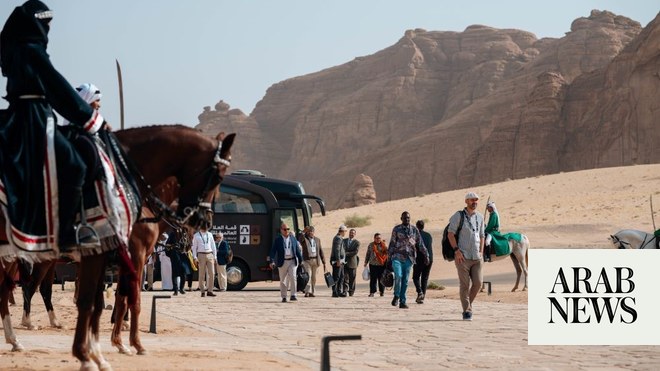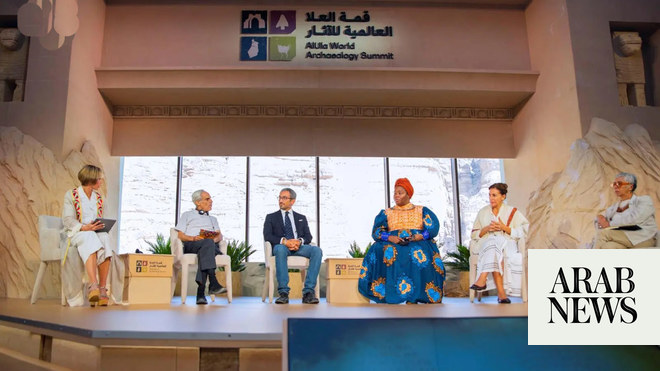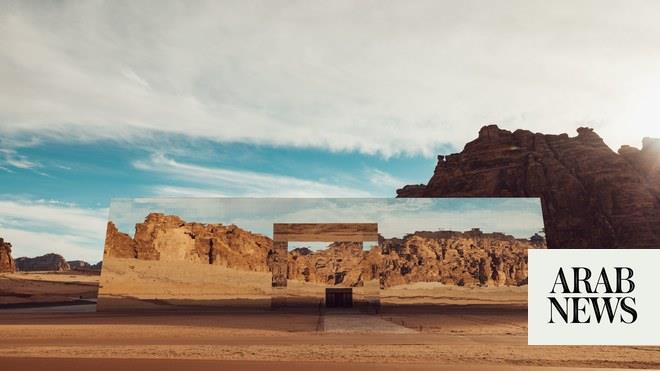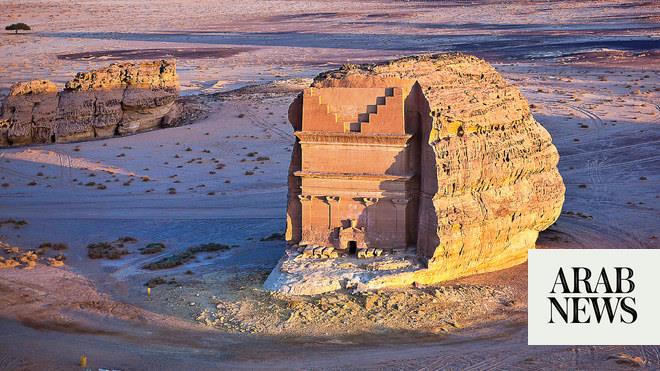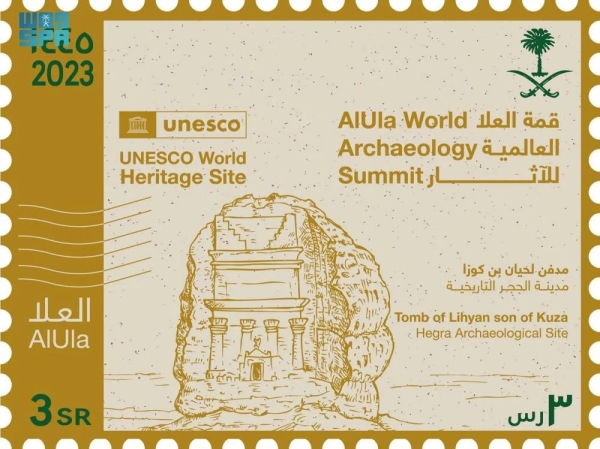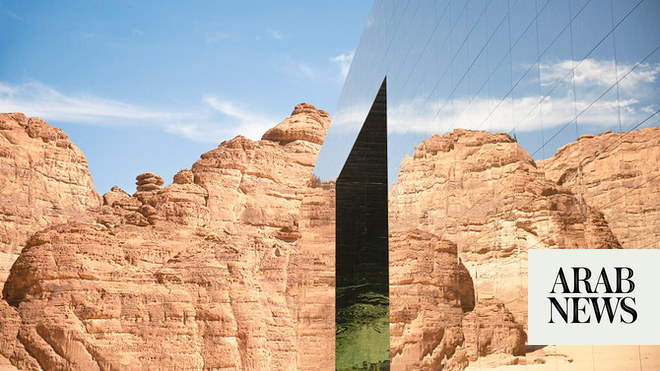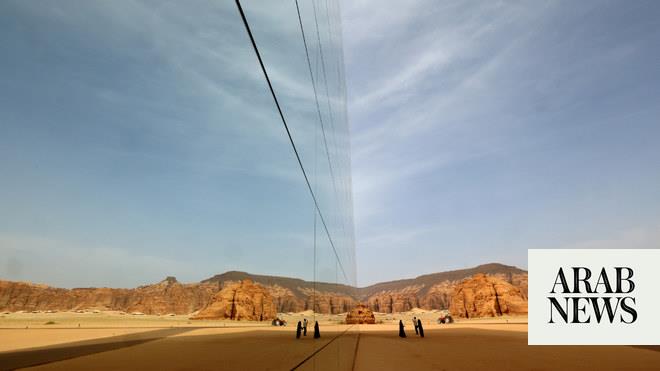
DHAHRAN: Saudi Arabia is home to a wealth of archeological treasures stretching from the Neolithic era to the early 20th century.
There is perhaps no better place in the region, therefore, to host a gathering of the world’s foremost minds in heritage and antiquity.
From Sept. 13 to 15, the Kingdom will stage the inaugural AlUla World Archaeology Summit in the eponymous ancient oasis city. Organized by the Royal Commission for AlUla, the summit will take place in AlUla’s Maraya Concert Hall.
It comes as the Saudi government implements policies designed to make it easier for foreign and local archeologists to access and examine the cultural heritage sites abundant in the country’s northwest.
The summit will feature 60 speakers of various professional backgrounds and specialties — from cultural heritage and archeology to media and entrepreneurship — from all around the world.
Sky view of AlUla Oasis. (Royal Commission for AlUla)
Abdulrahman Alsuhaibani, the RCU’s executive director of archeology, conservation, and collections, told Arab News: “The AlUla World Archaeology Summit will foster an environment of cross-disciplinary collaboration and knowledge exchange.
“Inspired by humanity’s shared past, we will focus on innovative solutions that can have a long-lasting impact on the world. We’re excited to host the inaugural summit in AlUla, where the world came to meet and where we will meet again.”
The RCU was founded by royal decree in 2017 and tasked with preserving and developing AlUla in line with Saudi Arabia’s Vision 2030 social reform and economic diversification agenda.
Alsuhaibani said the AlUla event had been classified as a summit rather than a mere conference because of the breadth of expertise delegates would be bringing to the table.
“This is not a scientific conference where we discuss scientific problems related to the field of archeology.
“This is a summit that intends to enable all archeologists and those from other domains related to the field of archeology, like museums and anthropology — all the domains related to archeology — to come together and collaborate,” he added. FAST FACTS
At least 60 professionals will arrive in the Kingdom to discuss developments in archeology.
The summit aims to enhance cooperation between archeologists from around the world.
Saudi Arabia has several heritage sites that were hitherto difficult for foreign experts to visit.
The summit will provide “a platform and stage” for discussing developments in the field — not just relating to Saudi Arabia and the Middle East, but to the wider world.
“This summit is also to enable the discussion of the challenges that we are facing in the world through archeology and other similar domains,” Alsuhaibani said.
One of the main topics due to be debated was identity and how archeology could shape or reshape perceptions of it. The main program for the invite-only event will focus on the four themes of identity, resilience, ruinscapes, and accessibility.
While the event will not be open to the public, the key themes and subjects covered will be made available along with video highlights shortly after its conclusion.
One important discussion planned for the summit will consider how archeology could be used to confront global issues.
It will also highlight how archaeological discoveries in Saudi Arabia could do more than just enhance understanding of local identity and history but also improve knowledge and appreciation of a shared common humanity.
AlJadidah Arts District in AlUla. (Royal Commission for AlUla)
AlUla is a fitting location to host such a discussion. Past and recent discoveries across the rich archaeological site in Saudi Arabia’s western Madinah province show it was a crossroads for various ancient cultures and a principal global trade route connecting the East and West.
In ancient times, AlUla was a market city and part of the incense trade route — an intricate network of roads for trading precious stones, silk, pearls, spices, and other luxury goods that connected the Mediterranean region with India through Egypt, the Levant, and, of course, modern-day Saudi Arabia.
In August, astronomy enthusiast Majed Al-Zahoufi explained the intimate link between the historical sites of AlUla and the cosmos. For millennia, there was a strong bond between early civilizations and the stars, vital for navigating long journeys, which continues to influence the region to the present day.
In addition to the abundance of physical evidence pointing to the existence of a vibrant ancient civilization in AlUla, stories shared by guides reveal how the vast desert region’s starry canopy played an instrumental role in guiding travelers and commercial caravans through the vast barren landscape.
All the evidence points to the region being an important trade route through the ages.
Al-Gharameel area in AlUla is a heaven for stargazing, where around 6,000 twinkling stars can be seen. (Supplied)
Discoveries made in AlUla and elsewhere in Saudi Arabia over recent decades have proven crucial to humanity’s common archeological understanding. Now AlUla will again play an important role in broadening understanding through the upcoming summit.
Robert Bewley, director of the Aerial Archaeology in Jordan and Oman projects, and a delegate at the upcoming event, told Arab News: “By having a summit, you are bringing together all the people who have worked over the last two or three decades and particularly the last five years.
“The reason it is important is that archeologists can only make their interpretation based on the evidence they’ve got. They always knew that there was a huge amount of archeological history in Saudi Arabia, but it was difficult to get access to it.
“For me, this summit is opening a door that has been closed for too long.”
Alsuhaiban noted how AlUla had rapidly become one of the largest hubs for archeological activities in the world, and pointed out that there were currently 14 field projects taking place in AlUla.
The Gharameel rock formations are composed of sedimentary layers shaped by ancient marine and riverine environments. (Supplied)
From October to December this year, more than 150 archeologists from around the globe are scheduled to carry out field work in the region.
On where to place the Arabian Peninsula in the history of the world, Bewley highlighted its “connectivity” as a crossroads of civilizations.
“If you turn the Mediterranean on its head and instead of looking north and south and seeing the Mediterranean as East and West, you can see that there has been a massive amount of trade and movement among peoples, from Africa to India and then up through the Arabian Peninsula,” he said.
Consequently, modern societies spread across Europe, Africa, and Asia are more connected by blood and by culture than they might otherwise believe or even realize — a point the AlUla summit hoped to convey.
“Ancient history and culture transcend our current national borders. That’s why this summit is so important because I am sure we will be able to have these conversations,” Bewley added.
AlUla Oasis landscape. (Royal Commission for AlUla)
The AlUla World Archaeology Summit will also reflect the objectives of Saudi Arabia’s Vision 2030 reforms, which seek to expand the Kingdom’s non-oil sectors and industries, including academic research, the sciences, conservation, and heritage tourism.
The summit will also overlap with Saudi Arabia’s hosting of the 45th session of the UNESCO World Heritage Committee, the first time the Kingdom has staged the event. It got underway in the capital Riyadh on Sept. 10 and will conclude on Sept. 25.
The twin events show the country is fast emerging as a prominent hub for high-level talks and cultural events in the region and beyond.




